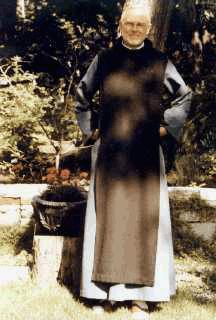|
The Practice of Christian
Meditation
The
aim of Meditation:
“The
important aim in Christian Meditation is to allow God’s mysterious and silence within us to become more and more not
only a reality but the reality which gives meaning, shape and purpose to everything
we do, everything we are.”
“Meditation is the very simple process by which we
prepare ourselves, in the first instance, to be at peace with ourselves so that we are capable of appreciating the peace of
the Godhead within us. The view of meditation that many people are encouraged to take as a means of relaxation, of retaining
inner peacefulness throughout the pressures of modern urban life, is not essentially wrong in itself. But if this is all it
is seen as being, the view is very limited because, as we become more and more relaxed in ourselves, and the longer we mediate,
the more we become aware that the source of our new-found calm in our daily lives is precisely the life of God within us. The degree of peace we possess is directly proportional to our awareness of this
fact of life.
This deep inner peacefulness is in a sense more freely available for us today than it was for the Hebrew psalmist
who wrote: ‘Be still and know that I am God’, even if our problems are greater and our pace of life faster than
his was. This is because of the great fact of JESUS.
The great conviction of the New Testament is that Jesus by giving us His Spirit has dramatically transformed the
fabric of human consciousness. St. Paul, writing to the Christians in Rome says: “Let us exult in the hope of the divine splendour that is to be ours, because
God’s love has flooded our inmost heart through the Holy Spirit He has given us (Rom. 5:4-5)
Word into Silence.
John Main OSB

“Meditation is a universal practice that leads beyond words, images and thoughts into the faith-filled and
presence–filled emptiness we call the silence of God. What is particularly Christian about it is the awareness that
it takes us , in faith into the prayer of Jesus himself.” The whole purpose of meditation is to allow more and more
Jesus to pray within us. And when we share in the human consciousness of Jesus who is simultaneously open to each of us and
to God, we can begin to be truly open to one another. We can create and experience the growing union of persons we call community.
As the fruits of the Spirit appear – love, joy peace, patience, kindness goodness, fidelity, gentleness and self-control
– so also does the grace of recognizing Jesus in ourselves and in one another.
Meditation and other forms of prayer:
Meditation - often called ‘pure prayer’ – does not replace other forms of prayer. What
these are in the lives of different people will depend on their temperament and vocation and the kind of Christian tradition
they are formed in. The reading of Scripture, Communal Prayer and worship, the prayer that expresses itself in physical acts
of compassion and works of charity are all irreplaceable elements of a life lived in the way of the Gospel. The forms they
take will vary. The practice of meditation is a living foundation for these –
not a substitute for them.”
A Pearl of Great Price
Laurence Freeman OSB
The Sermon on the Mount – Jesus’ teaching on Prayer:
1. Prayer like good works must not be merely outward. It is
not about looking holy or winning other people’s admiration. Nor is it even about feeling we are holy. Jesus says ‘your
left hand must not know what your right hand is doing’. Prayer is a humble and unselfconscious work which helps us discern
reality (Matthew 6:1-4)
2. Prayer must be interior. People who like their prayer to
be too public easily fall into hypocrisy, which is discord between our inner and outer identity. Jesus tells us to go to ‘your
private room’ and pray in that ‘secret place’. The word ‘secret’ here also means ‘mysterious’.
Mystery is not magic. It is the experience of reality which mental consciousness by itself cannot contain or understand. Prayer
is by nature mysterious, and the deepest place of mystery in human life is the heart. The ‘private room’ is a
metaphor for the inner chamber of the heart (Matthew 6:5-6)
3. In prayer we must not ‘babble on’. More words do not make God hear us better. Prayer is not about
quantity – ‘prayers’ – but about quality – “attention” (Matthew 6:7-8)
4. Prayer is not primarily about asking God for things because he ‘knows what we need before we ask him’
(Matthew 6:8)
5. We must give priority to the spiritual treasures of the kingdom rather than material well-being. (Matthew 6:
19-21)
6. We must learn to stop worrying about the future and to trust in God. Anxiety is an enemy of prayer. It makes
us too self-centred and prevents us from realizing the gift already deposited in love in our heart.
7. Finally Jesus says prayer is about ‘setting your mind on God’s kingdom first’. In other words,
be attentive to the ‘one thing necessary’ – be mindful. Then all the other things will come to you as well.
(Matthew 6:33)
These seven teachings of Jesus on prayer are what we put into practice in meditation – humility, interiority,
silence, trust, spirituality, peace and attention.
Christian Meditation – Your Daily Practice
Laurence Freeman OSB

|
| John Main OSB (1926-1982) |
John Main OSB (1926-1982)
John Main believed that the contemplative experience creates community. His genius was to recover and
to re-present a way into this experience for ordinary people from within the Christian contemplative tradition. In the teaching
of the desert monks on pure prayer he found the practice of the mantra. Realising that this way of prayer could further the
search of many modern people for a deeper spiritual life, he recommended two regular daily periods of meditation to be integrated
with the usual practices of Christian life.
A Way of Compassion
It has become more and more evident in recent years that meditation, as a way of tolerance and compassion,
builds a bridge of the spirit between peoples of different faiths, between rich and poor, and between all those suffering
conflict or division. The great social and psychological distresses of modern society call for a deep contemplative response.
John Main believed that each human being, whatever their lifestyle, is called to this contemplative depth.
The Meditation
Group
It is a sign of this vision that meditation groups continue to form around the world. They meet weekly
and support each person's own daily commitment to the inner pilgrimage. These groups often make use of the collection of John
Main's talks recorded during his teaching of similar groups. Each group is linked in a common spirit to the wider community.
Most meditation groups today are led by lay people. In this renewal of a Christian tradition of prayer
there is also great potential for Christians of all denominations to meet in common faith. Indeed, people of all religions
can meet in their common humanity by meditating together. Thirty years ago, in 1975, John Main began the first meditation
groups at his monastery in London and, later, in Montreal.
|